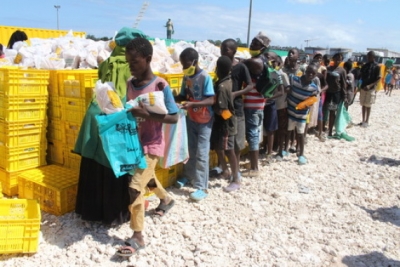Over 295 mn people across 53 countries faced acute hunger in 2024: UN
By IANS | Updated: May 16, 2025 17:37 IST2025-05-16T17:30:55+5:302025-05-16T17:37:53+5:30
Geneva, May 16 Acute food insecurity and child malnutrition rose for the sixth consecutive year in 2024, pushing ...

Over 295 mn people across 53 countries faced acute hunger in 2024: UN
Geneva, May 16 Acute food insecurity and child malnutrition rose for the sixth consecutive year in 2024, pushing more than 295 million people across 53 countries to the brink, according to a joint report by UN agencies released on Friday.
This is an increase of 13.7 million from 2023, said the report, blaming conflict, economic shocks, climate extremes, and forced displacement for the global rise in food insecurity and malnutrition.
It showed that the prevalence of acute food insecurity is worsening -- standing at 22.6 per cent of the population. 2024 marks the fifth consecutive year in which the figure has remained above 20 per cent.
During the same period, the number of people facing catastrophic hunger more than doubled to reach 1.9 million -- the highest since tracking began in 2016, the report said, adding that hunger shocks will likely persist into 2025.
“This Global Report on Food Crises is another unflinching indictment of a world dangerously off course,” said United Nations Secretary-General António Guterres.
“Long-standing crises are now being compounded by another, more recent one: the dramatic reduction in lifesaving humanitarian funding to respond to these needs. This is more than a failure of systems -- it is a failure of humanity. Hunger in the 21st century is indefensible. We cannot respond to empty stomachs with empty hands and turned backs,” he added.
Further, the report cited “extremely high levels” of malnutrition, particularly among children in the Gaza Strip, Mali, Sudan, and Yemen. Nearly 38 million children under five were acutely malnourished across 26 nutrition crises.
The report also highlights a sharp increase in hunger driven by forced displacement, with nearly 95 million forcibly displaced people, including internally displaced persons (IDPs), asylum seekers, and refugees, living in countries facing food crises such as the Democratic Republic of Congo, Colombia, Sudan, and Syria out of a global total of 128 million forcibly displaced people.
Acute food insecurity and malnutrition have increased to record levels, yet global funding is experiencing its fastest decline in years, and political momentum is weakening.
The report called for a bold reset -- one that prioritises evidence-driven and impact-focused action -- to break the cycle of rising hunger and malnutrition.
Disclaimer: This post has been auto-published from an agency feed without any modifications to the text and has not been reviewed by an editor
Open in app